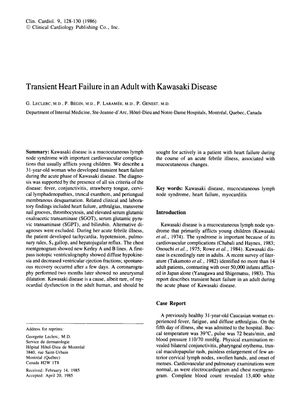Transient Heart Failure in an Adult with Kawasaki Disease
March 1986
in “
Clinical Cardiology
”

TLDR An adult with Kawasaki disease experienced temporary heart failure but recovered without lasting heart damage.
In 1986, a 31-year-old woman experienced transient heart failure during the acute phase of Kawasaki disease, a condition more commonly seen in children. She displayed all the classic symptoms of the disease, including fever, conjunctivitis, strawberry tongue, cervical lymphadenopathies, truncal exanthem, and periungual membranous desquamation, along with additional symptoms such as heart failure, arthralgias, transverse nail grooves, thrombocytosis, and elevated liver enzymes. Despite the severe cardiac symptoms, including tachycardia, hypotension, pulmonary rales, an S3 gallop, and hepatojugular reflux, as well as a chest roentgenogram showing Kerley lines and reduced ventricular ejection fractions on isotopic ventriculography, she recovered spontaneously within a few days. Follow-up coronarography showed no aneurysmal dilatation. This case demonstrated that Kawasaki disease can occur in adults and be a cause of myocardial dysfunction, suggesting that it should be considered as a potential diagnosis in adults presenting with heart failure and mucocutaneous symptoms during a febrile illness.